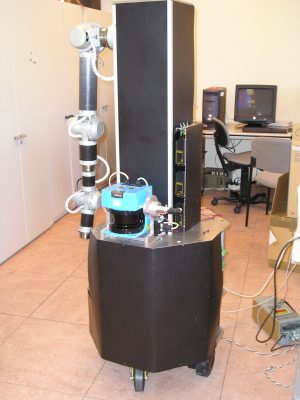The main objective of IPCIS Project is the development of new capabilities to operate into the environment for the MANFRED mobile manipulator. The development of a new sensor-based planning and control architecture will allow the integration of sensor information coming from a laser scan, vision and a force/torque sensor. To reach this aim efficiently three complementary goals are required:
- A functional architecture to integrate perception, control, local
and global planning in order to the mobile manipulator can cope with a wide
spectrum of typical tasks required for a service robot operating in indoor
environments (displacement in not cluttered areas, displacement in cluttered
areas, door opening and collaboration with humans in the transport of a simple
object). The architecture will be based on external sensor feedback for interaction
control and sensor based local planning to achieve a proper combination of
reactivity to environment and smoothness in interaction control with objects.
- An interaction control system based on a sensorial feedback of an impedance
control. By introducing the positional error between the arm end effector
and the object as sensor feedback in the impedance control loop, the
tolerance to position uncertainty of the mobile manipulator will be improved
considerably. The force control strategy will be based on an impedance control
due to the object to manipulate are not exactly the same and the task will
be sporadically done. - A perception system based on a laser scanner (2D and 3D) and
stereovision will be used to solve the displacements and approximation problems,
and a vision system will be used to estimate the positional error during
the interaction task.

